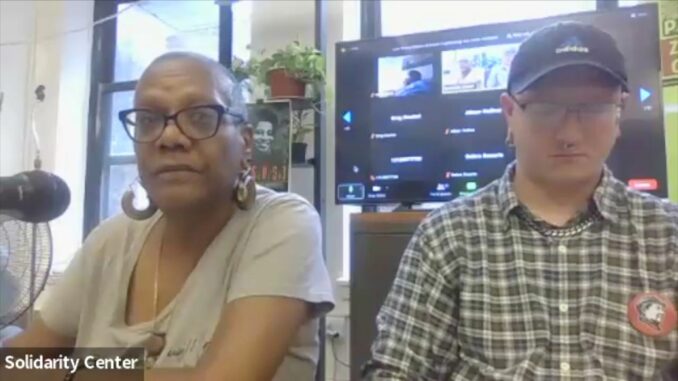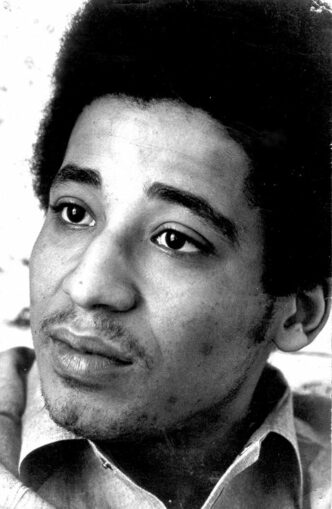The legacy of Black August
The following excerpts are from a Black August tribute given by Workers World managing editor Monica Moorehead at an Aug. 19 New York City branch meeting organized by Workers World Party on “Why we defend China.”

Monica Moorehead speaks of Black August at Aug. 19, 2023 meeting in New York City.
For many revolutionaries and activists of my generation, Black August, which was ignited in the early 1970s, played a significant role in our political development and activism. I had just graduated from high school in Virginia when Jonathan Jackson attempted to free his brother, George Jackson, an imprisoned leader of the Black Panther Party, Ruchell Magee, another political prisoner — who was recently released after being incarcerated for 67 years — and others. Jonathan took a judge and others hostage in a Marin County courtroom in San Rafael, California, on Aug. 7, 1970.
And even though Jonathan, at the tender age of 17, and others were brutally slaughtered by the police, this daring escape attempt to this day continues to have a profound impact on the Black Liberation Movement — including prison abolition — 53 years later. It was a prelude of what was to come, with the most significant prison rebellion of the 20th century after George Jackson was executed a year later on Aug. 21, 1971.

George Jackson
Because George Jackson was so revered throughout much of the U.S. prison system, his assassination sparked the heroic, historic Attica Prison Rebellion in upstate New York. Then incarcerated workers took guards hostage to voice their righteous grievances to the world in early September 1971. Larry Holmes, WWP’s first secretary, stated in a 2016 Workers World article that the Attica Prison Rebellion was the “Black Liberation Movement’s Paris Commune.” (workers.org/2016/09/26893/)
The legacies of Jonathan and George Jackson forever enshrined Black August as a commemoration of Black resistance, in whatever form, to white supremacy.
Lenin’s contribution to the national question
Black August is rooted in a theoretical and practical understanding of the national question: that there are super-exploited oppressed nations and a dominant white oppressor nation with a repressive state apparatus to protect profits and private property.
Today we build towards an anti-imperialist assembly in January 2024 to commemorate the centennial of the death of Vladimir Lenin, the leader of the 1917 Bolshevik Revolution that led to the birth of the Soviet Union. It was Lenin’s theory that defined the colonial question at a time when national liberation movements began erupting in Africa, Asia, the Middle East, Latin America and elsewhere against the onslaught of imperialist plunder and exploitation.
Great revolutionary leaders like Che Guevara, Fidel Castro, Mao Zedong, Amilcar Cabral, Ho Chi Minh and others took the teachings of Lenin to heart. They applied those lessons to guide the masses in their own countries toward national liberation from neocolonialism and in many cases to socialist revolution.
It was Lenin’s understanding of the national question and the need for proletarian internationalism that prompted him to expand the Marxist slogan, “Workers of the World Unite” to “Workers and Oppressed Peoples of the World Unite.”
Black August is an important month to rededicate ourselves today as revolutionary socialists and communists to defend the right to self-determination for nationally oppressed peoples — Black, Latinx, Indigenous, Arab and Asian nations. We must support their fight against a billionaire class and its repressive arm on a global scale, “by any means necessary” to quote the great Malcolm X.
There are so many anniversaries and struggles that can be tied to Black August, whether it’s the birth of the nationalist leader Marcus Garvey, founder of the largest mass movement of Black people worldwide, the United Negro Improvement Association, or the 1995 mass mobilization in Philadelphia that stopped the scheduled execution of political prisoner Mumia Abu-Jamal, which was to take place on Aug. 17, the birth date of Garvey.
At George Jackson’s funeral, Black Panther Party co-founder Huey P. Newton gave the eulogy, saying in part, “George Jackson was my hero. He set a standard for prisoners, political prisoners, for people. He inspired prisoners, whom I later encountered, to put his ideas into practice, and so his spirit became a living thing. [H]e will go into immortality, because we believe that the people will win as they advance, generation upon generation.”
Long live the spirit of George and Jonathan Jackson!
Free all political prisoners!
Long live the legacy of Black August!

